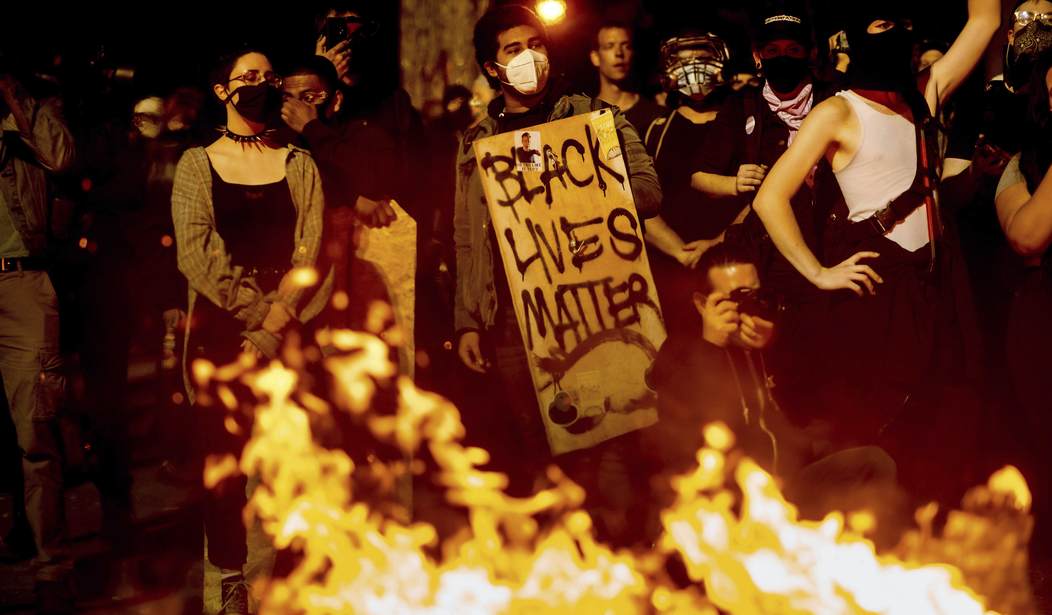If you own property, perhaps you’re promoting racism.
So seems to suggest a teacher at Boston University.
On May 25th, the school posted a Twitter thread in observance of the two-year anniversary of George Floyd’s death.
Included were videos featuring “several members of the BU community, from students to legal scholars,” waxing on lessons “from the tragedy and what progress still needs to happen.”
In one clip, Professor Saida Grundy addressed the nationwide destruction that occurred during much of 2020.
The sociology and African American studies instructor looked to be less than lugubrious about $2 billion in damage:
“If we’re going to talk about George Floyd and really understand it, then we need to understand community reactions to it. And we often hear politicians, we hear civic leaders from inside black communities and outside of them as well. We hear President Biden say, you know, ‘I understand your frustrations, but don’t destroy property.’ Well, when you say that to black people — who, historically, have been property — one of our greatest weapons against injustice was the looting of ourselves as property from the system of slavery.”
“I think it’s very important for people who see reactions in communities not to judge or make assumptions about what is good and not good reactions. And not actually re-victimize communities by saying there’s an acceptable and not acceptable way to react.”— @BU_CAS‘s Saida Grundy pic.twitter.com/FK85qVF3Xf
— Boston University (@BU_Tweets) May 25, 2022
It’s an interesting idea — U.S. slaves stole themselves. The concept suggests a complex relationship with the fact that they were freed.
Concerning one particular race being historically held as property, as Thomas Sowell has pointed out, the history of slavery is nothing if not robust:
Of all the tragic facts about the history of slavery, the most astonishing to an American today is that, although slavery was a worldwide institution for thousands of years, nowhere in the world was slavery a controversial issue prior to the 18th century. People of every race and color were enslaved — and enslaved others. White people were still being bought and sold as slaves in the Ottoman Empire, decades after American blacks were freed.
Furthermore, from the BBC:
The term “slave” has its origins in the word “slav.” The slavs, who inhabited a large part of Eastern Europe, were taken as slaves by the Muslims of Spain during the ninth century AD.
Regarding 2020’s violent riots (differentiated from peaceful protests by socially-conscious Americans), it appears to me they weren’t fueled by the mantra of “Black lives matter.” Nor did they come compliments of “black people,” per se.
I may well be wrong, but it strikes me that many, many mostly-white twenty- and thirtysomethings had been culturally encouraged to burn down the world. They’d been convinced capitalism had made them baristas whereas socialism would crown them Starbucks CEOs. They’d had very little required of them while a great deal had filled their laps. They’d been informed the system was evil, and they’d been tweaked to the tune of “good trouble.” They’d been confined to their homes due to COVID in a world increasingly numb from nihilism.
Whatever other ingredients were involved, a perfect storm stirred in their beleaguered bellies — right beneath the luxury-brand logos of their $60 shirts. It shot down to their $200 shoes; it surged through their “Like”-thirsty thumbs. The online virtue-signaling created a cacophony of momentary meaning as they organized via their $1,000 phones. Oppression had been their albatross, but they were about to shoot it the bird.
Or maybe it was just laundry day, so black sweatpants were a go; and our current version of dating is his-and-hers vandalism.
Either way, fast-forward to empty stores and fire melting glass.
According to Professor Saida, I’m sorely off.
And also, property’s racist:
“And what we see in communities is they’re reacting to the very racism of what we call ‘property,’ right? So that’s why I think it’s very important for, you know, people who see reactions in communities to not judge and to not make assumptions about what is good and not good reactions. And not actually re-victimize communities by saying there’s an acceptable and a not-acceptable way to react.
The inherent racism of property would create quite the conundrum: Anyone in possession of property would need to have it seized; but just as it’s newly-acquired, it’d become racist again.
And if only select citizens deserve its ownership, how do we discern who has dibs on what?
All considerable questions, and they won’t be answered here. Hopefully, Professor Saida or someone with similar insight will figure it all out.
In the meantime, as for a mantra upon which to build a civil society, “Don’t destroy property” seems a substantially solid choice.
-ALEX
See more content from me:
In Honor of America’s Heroes, Hollywood Star Chris Pratt Proves He’s Not Like the Rest
Christian Mark Wahlberg Congratulates His Son and All Teens Seeking a ‘Relationship With the Lord’
Christianity Takes Another Step: The Church of Scotland Approves Gay Marriage
Find all my RedState work here.
Thank you for reading! Please sound off in the Comments section below.













Join the conversation as a VIP Member